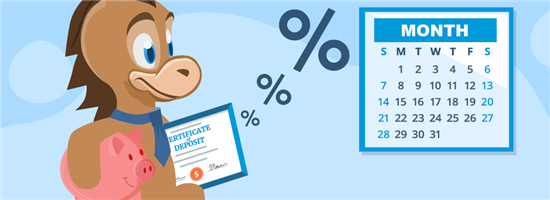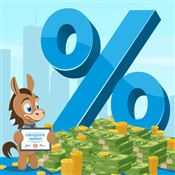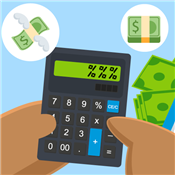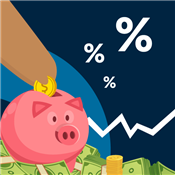Best 1 Month CD Rates for February 2024
Ad Disclosure: This article contains references to products from our partners. We may receive compensation if you apply or shop through links in our content. This compensation may impact how and where products appear on this site. You help support CreditDonkey by using our links.
Who has the best 1-month CD rates? Find out here.
 |
Are you holding back from spending until next month? Perhaps a 1-month CD can help you.
CDs require you to keep your money locked in during the term in exchange for a fixed rate. Otherwise, you get early withdrawal penalties.
It's a good way to stop yourself from spending. But, the rates may not be as impressive. Read on to learn more about 1-month CDs.
What is a 1-Month CD?
A 1-month or 30-day CD is a savings account that lets you deposit a fixed amount of money for a set 1-month term in exchange for a specified APY. Typically, the rate will be higher than your average savings account.
One of the highest rates on a 1-month CD is .
How Do 1-Month CDs Work?
A 1-month CD is just like other CDs, but with a very short term, so you don't lock in your money for too long.
However, they are quite rare, and their rates are often not great due to the short commitment. Many have APYs much lower than the national average[1].
For this reason, some high-yield savings accounts might be better options for higher APY if you simply need to place to temporarily park your money.
Banks and credit unions would usually offer 3 months or 6 months as their shortest term on CDs. But technically, 1-month CDs would be the shortest term available albeit very rare in the market.
How Much Does a 1-Month CD Pay?
If you put $1000 into a 1-month CD with a 2.50% APY, you'll earn around $2 when the month ends.
Below is a table showing how much you could earn with various amounts and APYs on a 1-month CD.
| Rate | $1,000 | $2,000 | $5,000 | $10,000 |
|---|---|---|---|---|
| 0.50% | $1,000 | $2,001 | $5,002 | $10,004 |
| 1.00% | $1,001 | $2,002 | $5,004 | $10,008 |
| 1.50% | $1,001 | $2,002 | $5,006 | $10,012 |
| 2.00% | $1,002 | $2,003 | $5,008 | $10,017 |
| 2.50% | $1,002 | $2,004 | $5,010 | $10,021 |
| 3.00% | $1,002 | $2,005 | $5,012 | $10,025 |
| 3.50% | $1,003 | $2,006 | $5,014 | $10,029 |
| 4.00% | $1,003 | $2,007 | $5,016 | $10,033 |
| 4.50% | $1,004 | $2,007 | $5,018 | $10,037 |
| 5.00% | $1,004 | $2,008 | $5,020 | $10,041 |
| 5.50% | $1,004 | $2,009 | $5,022 | $10,045 |
You can use this convenient CD calculator to check out how much you can get with other APY and amounts.
Earning interest on a CD is not that different from other savings accounts. But in a CD, you get a fixed rate over the fixed term. Compound interest can also be done daily, monthly, quarterly, or annually at the discretion of the bank.
Is a 1-Month CD Worth It?
If you're looking to control spending for a month and need motivation, a 1-month CD can help. Most CDs penalize you for taking out money early, making it less tempting to access your funds before they mature.
A 1-month CD also suits short-term goals, but it may not be the best for growing your money. Consider other CDs with 3 to 12-month terms for better rates.
You can also check out high-yield savings accounts as they typically offer competitive rates and more flexibility.
The answer depends on your financial goal, specifically the timeline to reach your goal. You want to choose a CD term that would suit you best. So if you have a goal to meet in 1 month, then you can hold a CD for a month.
Can You Lose Money on a 1-Month CD?
You won't usually lose money on CDs because they are federally insured for up to $250,000 if your bank or credit union is a member of the FDIC or the NCUA. That means your bank could fail but you can rest assured that your deposits are covered.
However, CDs usually are subject to early withdrawal penalties which can eat into your earnings if you choose to close your CD before its term ends.
1-month CDs and savings accounts are both federally insured for up to $250,000 if your bank or credit union is a member of the FDIC or the NCUA. That means your money is safe in either account in case that bank fails.
Pros and Cons of a 1-Month CD
Here's what to expect when you get a 1-month CD:
Pros:
- Short-term commitment
- Avoid spending temptations
- Federally insured up to $250,000 by the FDIC or NCUA
Cons:
- Low APY
- Costly early withdrawal penalties
CIT Bank Platinum Savings - 3.75% APY
- 3.75% APY with a balance of $5,000 or more
- 0.25% APY with a balance of less than $5,000
- $100 minimum opening deposit
- No monthly maintenance fee
- Member FDIC
Early withdrawal penalties would depend mainly on the term length of a CD. In this case for 1-month CDs, it would usually be the full term's worth of interest. Make sure you read the product's terms and conditions before you attempt to withdraw your CD early.
Where to Find the Best 1-Month CD Rates
1-month CDs are not commonly found in the market because banks don't gain much from such short-term commitments. When they are available, the APY is typically low.
However, if you're looking for more competitive CD rates, your best bet would be to look at online banks and credit unions. These can give good rates because of their relatively low overhead costs.
How to Open a 1-Month CD
Opening a 1-month CD can be pretty straightforward. When you do find a bank that offers it, here's what you have to do to open a 1-month CD.
- Find out where you can open the CD.
Some banks and credit unions may limit the opening of some CDs to online platforms only or physical branches only, for example. - Answer the application form and review the terms.
Fill out the application form and submit the required documents. Then, review the terms and conditions which cover important details like interest payments, maturity date, and penalties for early withdrawal. - Submit and fund your CD.
You can submit your application after agreeing to the terms. Once submitted, you can fund your CD through various methods, such as online transfers, wires, or check deposits.
If you're not sure how to open a CD with a specific bank or credit union, you can always try to reach out to a representative to help you.
What Happens at the End of a 1-Month CD?
Your bank or credit union usually will let you know before your 1-month CD matures. But make sure you also know when your CD term ends. Once it does, you can:
- Let the CD roll over with the same terms.
- Renew the CD with a different amount, term, or both.
- Cash out and grab all your funds.
Alternatives to a 1-Month CD
1-month CD rates aren't the best. So if you want higher earnings with the same or better flexibility with your funds, here are some other options:
Longer CD Terms
If you can hold off spending for a few more months, other CD terms longer than a month can offer impressive APY.
No-Penalty CDs
For easy access to your funds, you can look for no-penalty CDs instead. Some of these have good rates too so you can make your money work harder until you need to withdraw.
- CIT Bank No Penalty CD:
3.75% APY - Raisin:
No-Penalty CD - Up to $1,500 Bonus - Mission Valley Bank:
3-Month No-Penalty CD - 3.80% APY - Sallie Mae Bank:
10-Month No Penalty CD - 3.00% APY
High-Yield Savings Accounts
Online high-yield savings accounts can get you better rates although they are not fixed. But, you get easy access to your funds without worrying about withdrawal fees.
- CIT Bank Platinum Savings:
3.75% APY - UFB Portfolio Savings:
Earn up to 3.26% APY - Western Alliance Bank:
High-Yield Savings Premier - 3.80% APY - Mission Valley Bank:
High Yield Savings Account - 3.86% APY - Axos ONE:
Earn up to 4.21% APY
Money Market Accounts
You have more flexibility with your money as some money market accounts come with a debit card, ATM access, and checks.
- UFB Portfolio Money Market:
Earn up to 3.26% APY
1-Month CD FAQs
What if I need to withdraw my 1-month CD early?
You usually cannot withdraw a CD before it matures. Otherwise, you'll be paying early withdrawal penalties.
Will 1-month CD rates go up?
If the Fed Funds rate continues to increase, you can expect CD rates to go up as well. However, there is no guarantee that 1-month CD rates will increase. Make it a habit to check on the Fed Funds rate changes to get an idea of how the CD rates can move.
Is there a CD that pays monthly?
Some CDs earn and pay out interest every month. It will depend on the specific CD offering whether it pays out daily, monthly, quarterly, or yearly. But remember that to maximize your earnings you'd want to keep your earnings in the CD until maturity.
What other CD terms are available?
CD terms can range from as short as 1 month and up to 10 years in length. However, not all banks will offer the same CD terms. If you can't find a 10-year CD at your usual institution, try shopping around other banks and credit unions.
Bottom Line
A 1-month CD might be good if you need a way to curb your spending until next month. But otherwise, there might not be much in terms of growing your money.
If you want higher returns, best to consider other savings options like high-yield savings accounts or longer CD terms.
Axos ONE - Earn up to 4.21% APY
- Earn up to 4.21% APY* on savings, and 0.51% APY* on checking when you meet requirements.
- Get your money up to 2 days early.
- No monthly maintenance, minimum balance, account opening, or overdraft fees.
High-Yield CD Rates - Up to 4.00% APY
- No fees
- $1 minimum deposit
- FDIC insured
| Term | CD Rates |
|---|---|
| 3 Month | 4.00% APY |
| 4 Month | 3.50% APY |
| 5 Month | 3.40% APY |
| 6 Month | 3.50% APY |
| 9 Month | 3.40% APY |
| 12 Month | 3.30% APY |
High-Yield Savings Account - 3.90% APY
- $1 minimum deposit
- No fees
- 24/7 online access to funds
- FDIC insured
References
- ^ FDIC. National Rates and Rate Caps, Retrieved 11/21/2023
Rue Atanacio is a research analyst at CreditDonkey, a bank comparison and reviews website. Write to Rue Atanacio at rue.atanacio@creditdonkey.com. Follow us on Twitter and Facebook for our latest posts.
Note: This website is made possible through financial relationships with some of the products and services mentioned on this site. We may receive compensation if you shop through links in our content. You do not have to use our links, but you help support CreditDonkey if you do.
|
|
| ||||||
|
|
|










